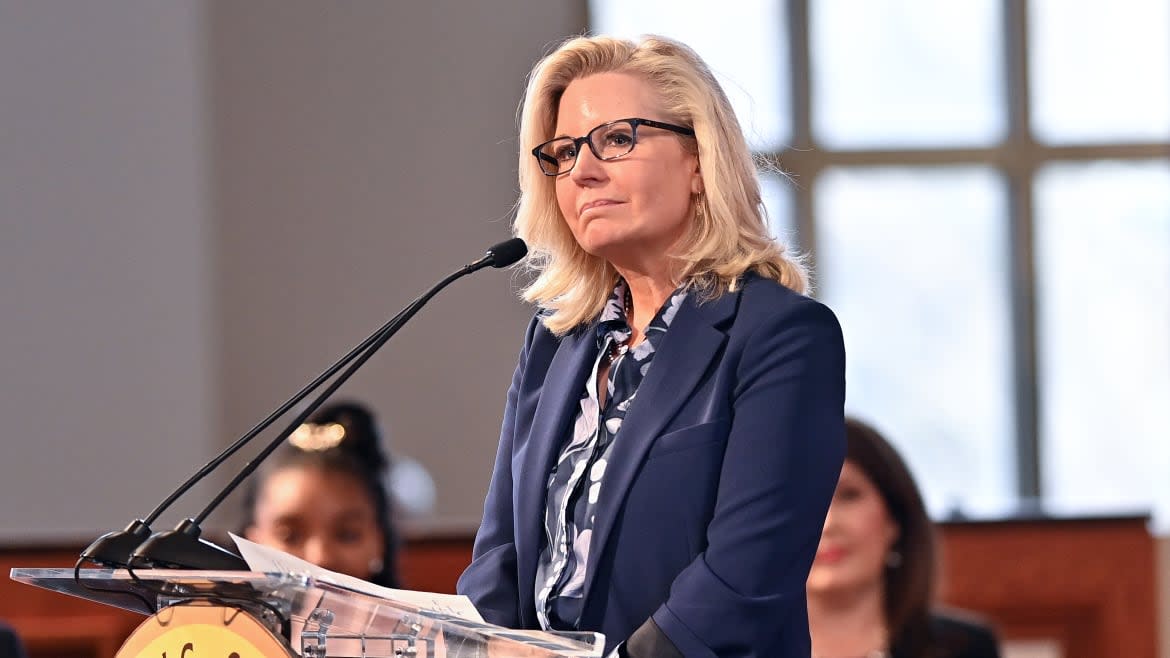Pulitzer-Winning Photographer Quits Ford Presidential Foundation Board in Protest of Cheney Snub

- Oops!Something went wrong.Please try again later.
- Oops!Something went wrong.Please try again later.
- Oops!Something went wrong.Please try again later.
- Oops!Something went wrong.Please try again later.
A celebrated photojournalist who was the chief White House photographer during Gerald Ford’s administration resigned on Tuesday from the foundation that bears the former president’s name, accusing it of succumbing to the “tidal wave of timidity and fear” created by Donald Trump.
David Hume Kennerly said in a letter that the organization’s board of trustees had rejected Liz Cheney for its top annual honor, the Gerald R. Ford Medal for Distinguished Public Service, over “agita” that Trump might retaliate should he win re-election.
“Some of you raised the specter of being attacked by the Internal Revenue Service and losing the foundation’s tax-exempt status as retribution for selecting Liz for the award,” he wrote in the letter, which was first obtained by Politico. “The historical irony was completely lost on you.”
Kennerly pointed out that Ford had ascended to the presidency because his predecessor, Richard Nixon, left office after the Watergate scandal, during which it was revealed he had ordered his underlings to retaliate against his enemies, sometimes through the IRS.
“That’s exactly what the executive committee fears will happen if there’s a second coming of Donald Trump. Did LT Gerald Ford meet the enemy head-on because he thought he wouldn’t get killed?” Kennerly asked. “No. He did it despite that possibility. This executive committee, on the other hand, bolted before any shots were fired.”
The 77-year-old said that Cheney, a fierce Trump critic, had been the obvious choice for the medal this year. In his letter, he outlined how he’d fought for her nomination, only for his fellow trustees to beat him back three times.
“When you rejected her again in favor of a third person, it became crystal clear to me that something else was going on,” he said. “The process for honoring President Ford by recognizing his virtues in others was being undermined by the same pressures weakening Republican institutions and many conservative leaders.”
Kennerly called the decision to spurn Cheney “inexplicable” and “short-sighted,” decrying it as a missed opportunity to send a clear message that the foundation stands against tyranny.
“If the foundation that bears the name of Gerald R. Ford won’t stand up to this real threat to our democracy, who will?” he asked.
Politico reported that Mitch Daniels, the former governor of Indiana, would receive the 2024 medal in June, citing an email that the Ford Foundations’ executive director sent to trustees after the publication of Kennerly’s letter.
The executive director, Gleaves Whitney, told Politico in a statement that the organization’s executive committee had decided, under legal counsel, it wouldn’t have been “prudent” to award Cheney the medal.
“At the time the award was being discussed, it was being publicly reported that Cheney was under active consideration for a presidential run by No Labels,” the statement said, referring to the nonpartisan organization that had flirted with the idea of a third-party ticket before mothballing it last week.
“Exercising its fiduciary responsibility, the executive committee concluded that giving the Ford medal to Cheney in the 2024 election cycle might be construed as a political statement and thus expose the Foundation to the legal risk of losing its nonprofit status with the IRS,” Whitney added.
After Politico’s report was published, Kennerly tweeted that his resignation had been “a painful decision,” but necessary. “I hope more people around the country will follow @Liz_Cheney’s example and speak out about the threat to our democracy,” he added. “Time to step up.”
A longtime staff photographer for United Press International, Kennerly also worked for Newsweek and Time. He won the Pulitzer Prize for Feature Photography in 1972 for his “dramatic photographs of the Vietnam War” the year prior, as the organization puts it on its website.
He joined the Ford Foundation’s board in the early 2000s.
Get the Daily Beast's biggest scoops and scandals delivered right to your inbox. Sign up now.
Stay informed and gain unlimited access to the Daily Beast's unmatched reporting. Subscribe now.

